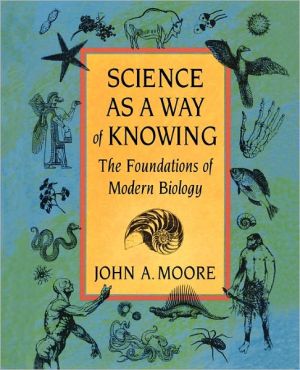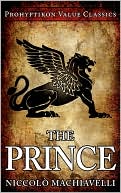Science as a Way of Knowing: The Foundations of Modern Biology
For the past twenty-five years John Moore has taught biology instructors how to teach biology—by emphasizing the questions people have asked about life through the ages and the ways natural philosophers and scientists have sought the answers. This book makes Moore's uncommon wisdom available to students in a lively and richly illustrated account of the history and workings of life. Employing a breadth of rhetoric strategies—including vividly written case histories, hypotheses and deductions,...
Search in google:
For the past twenty-five years John Moore has taught biology instructors how to teach biology—by emphasizing the questions people have asked about life through the ages and the ways natural philosophers and scientists have sought the answers. This book makes Moore's uncommon wisdom available to students in a lively and richly illustrated account of the history and workings of life. Employing a breadth of rhetoric strategies—including vividly written case histories, hypotheses and deductions, and chronological narrative—Science as a Way of Knowing provides not only a cultural history of biology but also a splendid introduction to the procedures and values of science. Nature This volume is a worthy addition to the literature on the history of biology. It explains the foundations of evolution, genetics, and development and the logic behind scientific enquiry with a clarity that will put most writers of...textbooks to shame. It both demystifies science and exalts it.
Introduction1Pt. 1Understanding Nature91The Antecedents of Scientific Thought112Aristotle and the Greek View of Nature303Those Rational Greeks?434The Judeo-Christian Worldview595The Revival of Science776Figur'd Stones and Plastick Virtue102Pt. 2The Growth of Evolutionary Thought1297The Paradigm of Evolution1318Testing Darwin's Hypotheses1489In the Light of Evolution17110Life over Time192Pt. 3Classical Genetics23111Pangenesis23312The Cell Theory25213The Hypothesis of Chromosomal Continuity26514Mendel and the Birth of Genetics28515Genetics + Cytology: 1900-191030216The Genetics of the Fruit Fly32817The Structure and Function of Genes360Pt. 4The Enigma of Development38518First Principles38719The Century of Discovery40320Descriptive Embryology41921The Dawn of Analytical Embryology44222Interactions during Development470Conclusion501Further Reading507References509Illustration Credits523Index525
\ NatureThis volume is a worthy addition to the literature on the history of biology. It explains the foundations of evolution, genetics, and development and the logic behind scientific enquiry with a clarity that will put most writers of...textbooks to shame. It both demystifies science and exalts it.\ \ \ \ \ \ New ScientistTo pen a single volume embracing the entire history and present compass of ideas about life and its evolution, from the cave art of Lascaux to the molecular genetics of today, is a formidable undertaking. To tell the developing story of biological thought as an illustration of the principles and methods of scientific enquiry in a much broader sense compounds the task. John Moore...has fulfilled these aims amply in a work of enormous scope. He has informed his book with wit, a gentle humanism, and considerable charm. Science as a Way of Knowing may well become a classic.\ \ \ \ Science NewsEmphasizing not just the steady accumulation of understanding but also the way in which understanding was achieved, Moore traces biology from its beginnings in ancient cultures, especially that of Greece, to its emergence as a modern scientific discipline. In sections covering the changing conception of nature in general, evolution, genetics, and organismal development, Moore's selection of case studies and hypotheses builds into a narrative account of the reason's biologists think as they do.\ \ \ \ \ \ NatureThis volume is a worthy addition to the literature on the history of biology. It explains the foundations of evolution, genetics, and development and the logic behind scientific enquiry with a clarity that will put most writers of...textbooks to shame. It both demystifies science and exalts it.\ \ \ \ \ New ScientistTo pen a single volume embracing the entire history and present compass of ideas about life and its evolution, from the cave art of Lascaux to the molecular genetics of today, is a formidable undertaking. To tell the developing story of biological thought as an illustration of the principles and methods of scientific enquiry in a much broader sense compounds the task. John Moore...has fulfilled these aims amply in a work of enormous scope. He has informed his book with wit, a gentle humanism, and considerable charm. Science as a Way of Knowing may well become a classic.\ \ \ \ \ Science NewsEmphasizing not just the steady accumulation of understanding but also the way in which understanding was achieved, Moore traces biology from its beginnings in ancient cultures, especially that of Greece, to its emergence as a modern scientific discipline. In sections covering the changing conception of nature in general, evolution, genetics, and organismal development, Moore's selection of case studies and hypotheses builds into a narrative account of the reason's biologists think as they do.\ \ \ \ \ Library JournalFrom the Greeks onward, our written records show that humankind has tried to answer ``simple'' questions--what is life, how does it reproduce, and why is there such diversity in plants and animals. Moore, professor emeritus of biology at the University of California at Riverside, traces these questions in history (primarily the 19th and 20th centuries) and their partial solution by biology. The result is a lucid, lengthy intellectual history of biology into which is woven information on geology, theology, people, equipment, and lab technique. Moore clearly explains biological terms, and he uses illustrations in the second part to help clarify biological processes. Much of this material appeared previously in eight essays in the American Zoologist . Recommended for all collections. --Michael D. Cramer, Viriginia Polytechnic & State Univ. Libs., Blacksburg\ \ \ \ \ BooknewsFor the past 25 years, the author has taught biology instructors how to teach biology by emphasizing the questions people have asked about life through the ages and the ways natural philosophers and scientists have sought answers. This work makes his uncommon wisdom available to students in a lively and richly illustrated account of the history and workings of life. Employs rhetoric strategies including case histories, hypotheses and deductions, and chronological narrative, providing a cultural history of biology and an introduction to the procedures and values of science. Includes b&w historical illustrations, and b&w photos of artifacts. The author is a professor of biology at UC-Riverside, and has written many textbooks in genetics and development. Annotation c. Book News, Inc., Portland, OR (booknews.com)\ \








